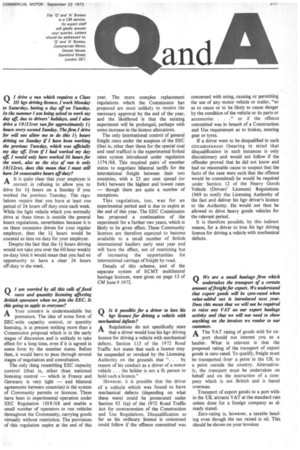Q I am worried by all this talk of fixed X
Page 217

If you've noticed an error in this article please click here to report it so we can fix it.
rates and quantity licensing affecting British operators when we join the EEC. Is this going to apply to everyone?
AYour concern is understandable but premature. The idea of some form of EEC-wide capacity control, or quantity licensing, is at present nothing more than a Commission proposal which is in the early stages of discussion and is unlikely to take effect for a long time, even if it is agreed in some form by the member states. Before then, it would have to pass through several stages of negotiation and consultation.
The only thing resembling EEC capacity control (that is, other than national licensing control — which in France and Germany is very tight — and bilateral agreements between countries) is the system of Community permits or licences. These have been in experimental operation under EEC Regulation 1018/68 and enable a small number of operators to run vehicles throughout the Community, carrying goods virtually without restriction. The provisions of this regulation expire at the end of this year. The more complex replacement regulations which the Commission has proposed are most unlikely to receive the necessary approval by the end of the year, and the likelihood is that the existing experiment will be prolonged, perhaps with some increase in the licence allocations.
The only international control of general freight rates under the auspices of the EEC (that is, other than those for the special coal and steel traffics) is the experimental forked rates system introduced under regulation 1174 /68. This required pairs of member states to negotiate bilateral tariffs for the international freight between their two countries, with a 23 per cent spread (or fork) between the highest and lowest rates — though there are quite a number of exceptions.
This regulation, too, was for an experimental period and is due to expire at the end of this year. The EEC Commission has proposed a continuation of the experiment for a further two years, which is likely to be given effect. These Community licences are therefore expected to become available to a small number of British international hauliers early next year and will have the effect, not of restricting but of increasing the opportunities for international carriage of freight by road.
Details of this scheme, and of the separate system of ECMT multilateral haulage licences, were given on page 13 of CM June 9 1972.
































































































































































































































































































































































































































































































































